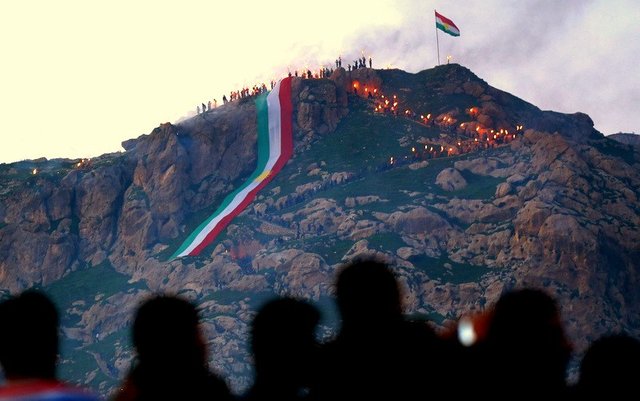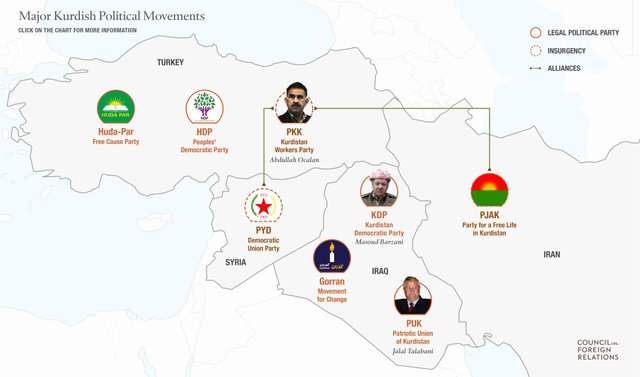Kurdish Independence and Disunity

An important thing to remember is that the ethnic marker “Kurd” refers to speakers of several different related, but distinct, languages. The two most important are Sorani in Iraq and Iran and Kurmanji in Syria, Turkey and smaller contiguous regions in Iraq and Iran. Sorani tends to use Arabic script, while Kurmanji uses Latin script, which shows how different they can be from one another.
Iraqi Kurdistan Regional Government (KRG) is predominantly made up of Sorani speakers, while the Kurdistan Workers’ Party (PKK), PYD and other nationalist groups in Syria and Turkey speak Kurmanji. This division naturally maps these divergent political expressions. It is not as simple as superimposing the KRG’s borders over the PYD and PKK-controlled territory.
On the other hand, Turkey does not contest Sorani speakers’ aspirations to the same extent as it does Kurmanji speakers. Encouraging the autonomy of the Iraqi Kurds should not entail the same problems for the Turco-American alliance as encouraging Syro-Turkish Kurdish nationalism would.
The quest for independence is intrinsic to Kurdish identity. However, not all Kurds envision a unified Kurdistan that would span the Kurdish regions of four different sovereign countries. Most Kurdish movements and political parties are focused on the concerns and autonomy of Kurds within their respective countries. Within each country, there are Kurds who have assimilated and whose aspirations may be limited to greater cultural freedoms and political recognition.
Kurds throughout the Middle East have vigorously pursued their goals through a multitude of groups. While some Kurds established legitimate political parties and organizations in efforts to promote Kurdish rights and freedom, others have waged armed struggles. Some, like the Turkish PKK, have employed guerrilla tactics and terror attacks that have targeted civilians, including their fellow Kurds.
The wide array of Kurdish political parties and groups reflects the internal divisions among Kurds, which often follow tribal, linguistic and national fault lines, in addition to political disagreements and rivalries. Tensions between the two dominant Iraqi Kurdish political parties, the Kurdistan Democratic Party (KDP) and Patriotic Union of Kurdistan (PUK) escalated to a civil war that killed more than 2,000 Kurds in the mid-1990s.
Political disunity stretches across borders as well, with Kurdish parties and organizations forming offshoots or forging alliances in neighboring countries. Today, disagreements over prospects for Kurdish autonomy in Syria or Iraqi Kurds’ relations with the Turkish government have fostered tensions that have pitted the Iraqi KDP and its Syrian sister organization, the KDP-S, against the PKK and its Syrian offshoot, the PYD. Still, adversarial Kurdish groups have worked together when it has been expedient. The threat posed by Daesh has led the KDP-affiliated Peshmerga to fight alongside Syrian PYD forces.

Kurdish groups have, at times, bargained with not only their own governments but also neighboring ones – in some cases at the expense of their relations with their Kurdish brethren. The complex relationships among Kurdish groups and between the Kurds and the region’s governments have fluctuated, and alliances have formed and faltered as political conditions have changed. The Kurds’ disunity is cited by experts as one of the primary causes for their inability to form a state of their own.
Related Articles that I have written and recently posted on Steemit that I highly encourage you to read as well:
-Amidst Universal Opposition to KRG Referendum, Israel Stands by Kurds
-Modern Day Horrors: Kurds Disarm Assyrians and Yazidis, Abandoning them to Daesh Onslaught
-Kurds and Assyrians: A Tumultuous Past and Present
-The Kurds: Ultra-leftist opportunists or real revolutionaries?
Thank you for your support! I really appreciate it.
good job sara @bed